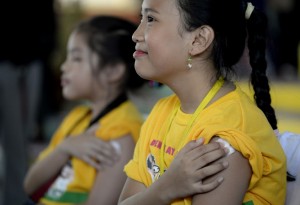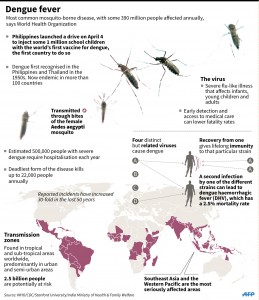
The Philippines began injecting up to one million school children with the world’s first vaccine for dengue fever, a mosquito-borne viral infection that is a leading cause of serious illness and death among children in some Asian and Latin American countries. / AFP / NOEL CELIS
MANILA, Philippines (AFP) — The world’s first public dengue vaccination program was launched in the Philippines on Monday as nurses began injecting the first batch of a million children with a French drug to combat the sometimes deadly disease.
Several hundred children aged 9-10 queued in front of government health workers at a public school in eastern Manila for the injections, capping a 20-year, 1.5-billion-euro ($1.8 bn) effort by French drug manufacturer Sanofi to develop the vaccine.
“We are the first country to introduce, adopt and implement the first-ever dengue vaccine through the public health system and under public school settings,” said Philippine Health Secretary Janette Garin.
The Philippines had in December approved the vaccine, the first to be licensed globally to combat the mosquito-borne disease for people aged between nine and 45.
https://youtu.be/sqIixo03y3M
Zelin Joice Carungay, aged nine, cried briefly as she and her classmates fell in line for the vaccine on teacher’s orders.
“I’m terrified of needles but they told us we need it to avoid dengue,” the girl told reporters.
“In the end it felt nothing more than an ant’s bite,” the relieved child said afterwards.
Dengue or haemorrhagic fever, the world’s most common mosquito-borne virus, infects an estimated 390 million people in more than 120 countries each year, killing more than 25,000, according to the World Health Organization.
Symptoms are often mild but more than two million people annually develop more serious symptoms — which can involve severe headaches, pain behind the eyes, a rash, pain in the joints, muscles or bones and leaking blood vessels.
Asia is home to some 70 percent of cases worldwide. In the Philippines200,000 cases were reported in 2013, according to Sanofi.
The company said the vaccine should prevent eight out of 10 dengue hospitalisations and up to 93 percent of severe haemorrhagic dengue fever cases.
“This initiative sends a strong message to the rest of the… world that dengue vaccination is a critical addition to integrated disease prevention efforts,” Sanofi said in a statement.
Sanofi’s two-decade effort to develop the vaccine included 25 clinical studies in 15 countries.
This saw 29,000 volunteers receive a vaccine that, aside from the Philippines, has also been registered in Mexico, Brazil and El Salvador, according to Sanofi.
Of 17,000 people who were injected with the vaccine in the Philippines in February as part of the clinical study, just 27 developed side effects, proving it was an effective vaccine, Health Undersecretary Vicente Belizario told reporters.
© 1994-2016 Agence France-Presse

SLUGVACCINE – HEALTH – DENGUE – PHILIPPINES
Creation date4/4/2016
CountryPHILIPPINES
CreditADRIAN LEUNG / AFP
Factfile on dengue fever. (Courtesy AFP)







